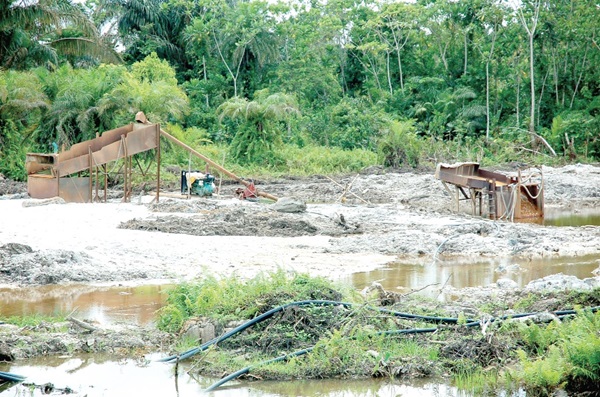
Ghana’s dying streams: A call for urgent action
My favourite Akan talking drums poem is about the stream and the path. It is often played on the atumpan drums on state occasions.
Advertisement
It is a poem that captures the elegance and wisdom of our forebears, which is evident in different forms in all Ghanaian cultures. I first read this poem in Cameron Duodu’s novel, the Gab Boys. Here is the poem:
The stream crosses the path,
The path crosses the stream,
Which is older;
We met the stream
When making the path;
The stream is from long ago
When the creator created things
This poem came back to me sometime last week in sad circumstances. I drove across a bridge without much thought at first. It was a regular bridge you encountered in towns and on highways nationwide. I may have gone over that bridge a million times. I exaggerate, of course, but you get the idea. After crossing the bridge, I realised it no longer spanned a stream but an empty gutter. I reversed and went over the bridge again.
I stopped and conversed with two people who appeared to be permanent locals. I asked them about the stream. Oh, the stream?
They were dismissive. It disappeared years ago. The drain waters fill the gutter when it rains, but it is no longer a stream.
In effect, we killed the stream when we made the path. That is what the modern atumpan drums must say because the stream no longer crosses the path. Over the next few hours, as I returned to Accra through many towns and villages in the Eastern Region, I stopped to ask about streams and paths.
The story was the same. The bridges still cover a lot of water when it rains, but those waters are washed from somewhere. The original streams have long disappeared.
The Collins Dictionary defines a stream as “a small narrow river”. What is the difference between a stream and water flowing through a drainpipe? The answer is simple.
According to the US Ecological Survey website, a stream typically has “aquatic organisms that include fish, but go far beyond that. Molluscs, like clams and mussels. Amphibians like salamanders and frogs. They include the larvae of many insects like dragonflies and mayflies…”
In short, a stream is a living organism that provides support and benefits for other life forms. Indeed, the National Geographic Encyclopedic Entry defines streams as “flowing bodies of water that provide benefits to humans and are important habitats to plants and animals”.
Now consider this: every settlement in our country is associated with a water body. The reason is that water supports life, and in the history of human migration, water bodies were often the main reason for settlements.
So, when streams die, something of immediate benefit to life dies, but also, importantly, a part of our heritage disappears. It is widely believed in many Ghanaian cultures that everything within our natural environment has spiritual significance.
Still, because of its association with life, streams are considered deities with special powers. This may be regarded as superstition, but rivers and streams are special in almost every faith.
The death of streams is a sign, if one was needed, that our nation endowed with abundant natural resources is facing an environmental crisis. The slow demise of its once-thriving streams and rivers, once teeming with life and vitality, now bears the scars of human exploitation. The culprits? Illegal mining, rampant deforestation and other harmful practices threaten not only the environment but also the livelihoods of countless communities.
We know that Galamsey has wreaked havoc on Ghana’s rivers. Driven by desperation and greed, miners extract gold, diamonds and other precious minerals from riverbeds using crude methods.
They employ toxic chemicals such as mercury, which seep into the water, poisoning aquatic life and rendering the rivers uninhabitable. The Pra, Ankobra and Birim rivers bear the brunt of this devastation.
We also know that deforestation exacerbates the environmental crisis. As forests are cleared for agriculture, logging and urban expansion, soil erosion intensifies. Rainwater washes away fertile topsoil, depositing it into rivers.
Sedimentation chokes river channels, reducing water flow and disrupting ecosystems. The once-clear waters of the Tano and Densu rivers now carry a murky burden.
However, we may not openly acknowledge the death of thousands of small streams, lakes, and rivers disappearing by the minute in our towns and villages.
This is where the disruption of the ecosystem is even more acute. The rampant building of homes without considering the ecosystem has dried out water bodies that provided a helpful balance to support all life forms.
Today, the balance has been tilted towards complete disruption, and coming generations may never know what a stream looked like or what attracted their forebears to settle where they are now.
They will not know the relevance of the conundrum of the stream and the path! These streams that have disappeared used to be alive. People fished and swam in them. There were places of social interaction where people met for work and leisure.
It is hard to be optimistic, but we must believe that it is not too late to do something to reverse the course of the catastrophe. Ghana must enforce existing environmental laws rigorously.
Stricter penalties for illegal mining and deforestation are essential. The good news is that streams can be revived, according to studies I have read.
Still, the processes that can preserve or restore our disrupted ecosystem demand disciplines and resources we don’t have, paramount among them being political will and awareness.
[email protected]




